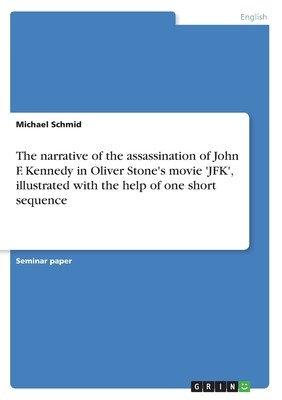
- We will send in 10–14 business days.
- Author: Michael Schmid
- Publisher: GRIN Verlag
- ISBN-10: 3638753913
- ISBN-13: 9783638753913
- Format: 14.8 x 21 x 0.1 cm, softcover
- Language: English
- SAVE -10% with code: EXTRA
The narrative of the assassination of John F. Kennedy in Oliver Stone's movie 'JFK', illustrated with the help of one short sequence (e-book) (used book) | bookbook.eu
Reviews
Description
Seminar paper from the year 2004 in the subject American Studies - Culture and Applied Geography, grade: 1,7, Free University of Berlin (John F. Kennedy Institut Berlin), course: HS American Cultural Memory: Trauma, Collective Imagery and the Politics of Remembering, language: English, abstract: Not many topics have produced more material than the subject of John F. Kennedy and his tragic death in November 1963. The more publications have occurred and keep occurring, the more it seems that narratives and explanations are multiplying and differing. John F. Kennedy is not only being remembered by the political world or his friends and family, he has become a symbol of youth, progress and reform which is being remembered by all kinds of people and all parts of society. Kennedy is being portrayed in popular culture such as movies, music, pop art and photography. His face is reoccurring constantly in the history books and in modern art. This text focuses on the cultural narrative of John F. Kennedy and his assassination in the movie "JFK" (directed by Oliver Stone in 1991). I am aware that there are multiple ways of approaching the subject of JFK and especially that John F. Kennedy means different things to different people. I will not try to cover all possible narratives involving JFK and the assassination but I will explain that the movie "JFK" had a specific agenda and a certain narrative which was portrayed very explicitly to the audience. When John F. Kennedy was assassinated, Oliver Stone was a teenager and thought of the killing of the president as a turning point in American modern history. After he had read Jim Garrison's novel "On the trail of the Assassins" (1988) in which Garrison, the district attorney of New Orleans at the time of JFK's death, described his research concerning the death of JFK, he decided to make a movie out of Garrison's story. His decision to direct "JFK" paid off not only because the movie stimulated a heated debate over the remaining
EXTRA 10 % discount with code: EXTRA
The promotion ends in 20d.15:31:24
The discount code is valid when purchasing from 10 €. Discounts do not stack.
- Author: Michael Schmid
- Publisher: GRIN Verlag
- ISBN-10: 3638753913
- ISBN-13: 9783638753913
- Format: 14.8 x 21 x 0.1 cm, softcover
- Language: English English
Seminar paper from the year 2004 in the subject American Studies - Culture and Applied Geography, grade: 1,7, Free University of Berlin (John F. Kennedy Institut Berlin), course: HS American Cultural Memory: Trauma, Collective Imagery and the Politics of Remembering, language: English, abstract: Not many topics have produced more material than the subject of John F. Kennedy and his tragic death in November 1963. The more publications have occurred and keep occurring, the more it seems that narratives and explanations are multiplying and differing. John F. Kennedy is not only being remembered by the political world or his friends and family, he has become a symbol of youth, progress and reform which is being remembered by all kinds of people and all parts of society. Kennedy is being portrayed in popular culture such as movies, music, pop art and photography. His face is reoccurring constantly in the history books and in modern art. This text focuses on the cultural narrative of John F. Kennedy and his assassination in the movie "JFK" (directed by Oliver Stone in 1991). I am aware that there are multiple ways of approaching the subject of JFK and especially that John F. Kennedy means different things to different people. I will not try to cover all possible narratives involving JFK and the assassination but I will explain that the movie "JFK" had a specific agenda and a certain narrative which was portrayed very explicitly to the audience. When John F. Kennedy was assassinated, Oliver Stone was a teenager and thought of the killing of the president as a turning point in American modern history. After he had read Jim Garrison's novel "On the trail of the Assassins" (1988) in which Garrison, the district attorney of New Orleans at the time of JFK's death, described his research concerning the death of JFK, he decided to make a movie out of Garrison's story. His decision to direct "JFK" paid off not only because the movie stimulated a heated debate over the remaining


Reviews